Main content
Top content
![[Translate to English:] Roboterfinger trifft menschlichen Finger. [Translate to English:] Roboterfinger trifft menschlichen Finger.](/fileadmin/documents/public/4_forschung/4.11_KI-Campus_Osnabrueck/2019_31_01_KI_Campus.png)
AI Campus at Osnabrück University
Technological Change: Research and the Human Interface
The Osnabrück University AI Campus is the product of long-term profile development in the field of Artificial Intelligence (AI). It exists at the nexus between the highly research-oriented yet applied fields of Computer Science, Cognitive Science, Business Informatics and Mathematics research groups.
- Research
- Endowment Professorships and Digitalization Professorships at Osnabrück University
- Academic Education and Training of Future Scientists and Scholars
- German Research Center for Artificial Intelligence (DFKI) Lab Lower Saxony
- Transfer of Research Findings
- Examples of Research Projects
- Existing AI Startups
- AI-related Programs of Study
- AI-PhD Research Groups
- AI-relevant Profile Lines (2017-2021)
Research
In addition to research in Information Technology and Cognitive Science, the AI-Campus also studies the implications of the ever-increasing use of artificial intelligence on the law, the social sciences and on ethics.
Approximately 20 professors are currently working in the AI-Campus, together with over 100 academic research assistants. The professorial team includes four endowment professorships which are sponsored either by trade and industry or by the Osnabrück city or district authorities. The procurement of additional professorships through the current Federal/Länder programs for Artificial Intelligence and/or Digitalization will reinforce the personnel situation of the AI-Campus in the long term. Osnabrück University has been highly successful in tendering for new digitalization professorships through the Federal Government of Lower Saxony, securing a number of new professors:
Endowment Professorships and Digitalization Professorships at Osnabrück University
Prof. Dr. Elia Bruni

Institute of Cognitive Science
Wachsbleiche 27
49090 Osnabrück
Room: 50/122
Tel.: +49 541 969-3532
Fax: +49 541 969-2246
elia.bruni@uni-osnabrueck.de
Prof. Dr. Rainer Mühlhoff

Institute of Cognitive Science
Wachsbleiche 27
49090 Osnabrück
Room: 50/318
Tel.: +49 541 969-3364
rainer.muehlhoff@uni-osnabrueck.de
Prof. Dr. Jan Oster

School of Law
Katharinenstraße 15
49078 Osnabrück
Tel.: +49 541 969-6451
ls-oster@uni-osnabrueck.de
Prof. Dr. Tim Kietzmann

Institute of Cognitive Science
Wachsbleiche 27
49090 Osnabrück
tim.kietzmann@uni-osnabrueck.de
Prof. Dr. Martin Atzmueller

Institute of Computer Science
Wachsbleiche 27
49090 Osnabrück
Room: 50/609
Tel.: +49 541 969-7372
Fax: +49 541 969 2799
martin.atzmueller@uni-osnabrueck.de
Prof. Dr-Ing. Olaf Spinczyk
Institute of Computer Science
Wachsbleiche 27
49090 Osnabrück
Room: 50/614a
Telefon: +49 541 969-2598
Fax: +49 541 969-2799
olaf.spinczyk@uni-osnabrueck.de
Prof. Dr. Frank Breiding

Institute of Mathematics
Albrechtstr. 28a
49076 Osnabrück
Room: 69/116
paul.breiding@uni-osnabrueck.de
The value placed on the AI-Campus at Osnabrück University is reflected in plans for a new building at the Westerberg site which is to house the various participating departments and institutes under one roof. The AI-Campus is also influential at the level of university governance; one of Osnabrück University’s vice presidents is a Professor of Cognitive Science.
One current and highly topical area of interest being addressed by the AI-Campus is the connectivity and the technical integration of data between machines, processes and stakeholders in agriculture. Spearheaded by Osnabrück University and numerous partners from academia, trade and industry and agriculture, funding made available by the Ministry of Science and Culture has been used to found the “Zukunftslabor Agrar (ZLA)” [“Future-Lab for Agriculture”] - one of six “digitalization future-labs” initiated by the Zentrum Digitale Innovationen Niedersachsen (ZDIN) [Center for Digital Innovations in Lower Saxony].
Top content
Academic Education and Training of Future Scientists and Scholars
The second pillar of the AI-Campus – which stands in parallel to its research – is academic education and the fostering of young scientists and scholars. In addition to the nationally outstanding bachelor, master and PhD programs at the Institute of Cognitive Science and the bachelor, master and PhD programs in Computer Science, the AI-Campus also offers an “integrated campus” master’s program in “Cognitive Computing” which enables students to study while in work. Graduates from this program are to a large degree overseas students, and are highly employable in an age of increasing skills shortages in AI-related regional and national industries. Thanks to the support of the government of Lower Saxony in granting additional AI-professorships, it has been possible to significantly increase the number of places available on this program.
Other particularly noteworthy opportunities for young scientists and scholars to advance their knowledge and training include the research training groups funded by the German Research Foundation (DFG) entitled “Situated Cognition” and “Computational Cognition” for the study of human and machine intelligence. A further PhD research group enables young academics to discuss issues pertaining to “Acceptance and Trust in Enhanced and Virtual Work Environments”.
German Research Center for Artificial Intelligence (DFKI) Lab Lower Saxony
The work of DFKI Laboratory, Lower Saxony is closely aligned with Osnabrück University’s AI-Campus, and was founded by the German Research Center for Artificial Intelligence (DFKI) in 2019. An extramural research institute located on two sites in Osnabrück and Oldenburg, it engages in research on the fundamental principles of AI and the transfer of AI methods to applications used in society and in trade and industry. In support of its activities, the two DFKI research areas had grown to a total of 65 scientists and scholars, and will grow further in the foreseeable future. To accommodate this growth, the DKFI in Osnabrück moved to a new site in a renovated historical building, the centrally located former railway roundhouse, or Ringlokschuppen. It provides a creative atmosphere for research projects as well as AI-related startups.
The degree to which the research fields of the AI-Campus and the DFKI-Lab Lower Saxony are interlinked is also reflected in the fact that the two research group leaders are both professors who teach and research at Osnabrück University. Plans are being drawn up for additional research groups at the Osnabrück site to expand the DFKI-Lab Lower Saxony.
If data are the oil of the 21st century, then AI is the engine that runs on this fuel. Together, they constitute the “power source” for digitalization.
(Stefan Weiss)
Transfer of Research Findings
Where the work of Osnabrück University’s “AI-Campus” and the “DFKI-Lab Lower Saxony” is primarily informed by highly competitive academic activities, other AI buildings at the Osnabrück site are devoted to transferring research findings into practice. Specifically, this means liaising with the research departments of medium-sized companies operating at the regional and national level and which are located in the vicinity of the AI-Campus. Virtually from the outset, it was clear how much value chains could be improved by using AI, but it was also obvious that companies were keen to recruit our excellently trained and educated graduates with their highly relevant bachelor, master, PhD and doctoral programs. It is now fair to say that the “research hub” which is devoted to the field of AI and which has been established by companies here has now also grown to a similar size as the AI-Campus and the DFKI-Lab, based on the number of AI experts working for it.
Ultimately, it is – in addition to the large number of AI-scholars – the close interdependency that exists between the AI-Campus, the DKFI-Lab and the AI research departments of companies that is the most significant contributor to enhancing Osnabrück as an attractive location for business and science, raising the prospect of Osnabrück becoming one of Germany’s key AI locations in the future. Here, Osnabrück University’s AI-Campus is complemented by the extramural DKFL-Lab Lower Saxony and industry’s receptiveness to AI, thereby delivering a unified body of AI expertise in the city of Osnabrück.
With its focus on the field of “artificial intelligence”, Osnabrück University not only has excellent prospects for its research and its promotion of young academics, it is also in a good position to provide answers to questions which will be of significant scientific, technical and social relevance in the decades to come.
Examples of Research Projects

A new collaborative project entitled “Artificial Intelligence as a Resource Efficiency Factor for Embedded Systems in Agricultural Machines” [Ressourceneffiziente Künstliche Intelligenz für eingebettete Systeme in Landmaschinen (ResKIL)] has been launched – its purpose is to improve resource efficiency in smart combine harvesters. The collaboration brings together science with trade and industry and seeks to optimise the computer systems which are installed in agricultural machines at the interface between AI software and the requisite hardware. Contributing partners at Osnabrück University include Prof. Dr. Olaf Spincyzk (CLAAS-HARTING Endowment Professorship for Embedded Systems at the Institute of Computer Science) and Prof. Dr. Joachim Hertzberg (Professor of Knowledge-Based Systems and Head of research in “Plan-Based Robot Control” at the German Research Center for Artificial Intelligence). Additional partners include CLAAS E-Systems GmbH, CLAAS Selbstfahrende Erntemaschinen GmbH, Zauberzeug GmbH and the Technical University Dortmund. The Federal Ministry of Food and Agriculture has provided approx. €1.57m in funding for the project. Osnabrück University has received in excess of €250,000 for this sub-project. Press Report
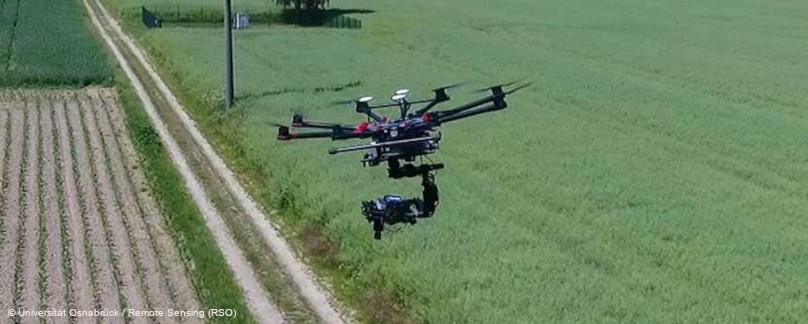
“Agri-Gaia” is a large-scale project which seeks to create an infrastructure allowing companies and producers across the industry to share and exchange data and algorithms which are being generated and used in digitalized agriculture. With partners from the fields of research, politics, professional associations and industry under the direction of the German Research Center for Artificial Intelligence (DFKI), this project seeks to develop a data norm and a cloud-based solution. Osnabrück University is participating in the field of Remote Sensing in Agriculture and providing legal expertise. The project is being funded by the Federal Ministry for Economic Affairs and Climate Action (BMWi) to a total of €12m. Osnabrück University will receive €1m. Press Report
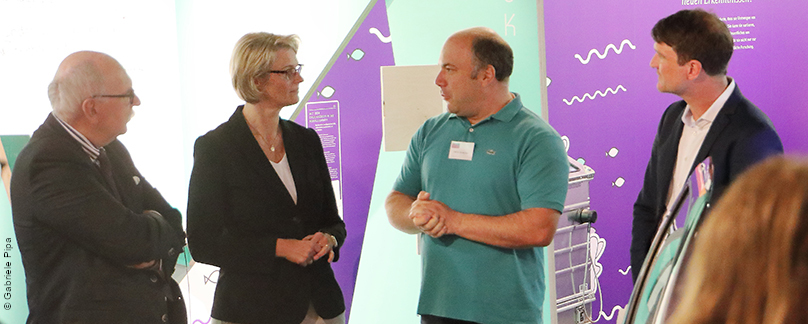
Under the direction of Prof. Dr. Peter König and Prof. Dr. Gordon Pipa, this research group is studying the degree to which artificial intelligence is accepted in autonomous, self-driving vehicles. The project, entitled “Westdrive” is one of the numerous research activities taking place on the AI Campus, where the university brings together research-focussed and applied fields addressing issues relating to AI and digitalization. Underlying the AI Campus is the premise that artificial intelligence, self-driving cars and medical assistance systems are increasingly becoming part of our everyday lives. At the same time, however, most people remain unconvinced about them, because we users neither understand or comprehend the functioning and decision-making of artificial intelligence systems. Prof Pipa explains: “Only when an AI is in a position to explain its decision-making in exactly the same way as a human being can, will we as users or as members of a society be in a position to evaluate their decisions and learn to trust in the systems.” Press Report
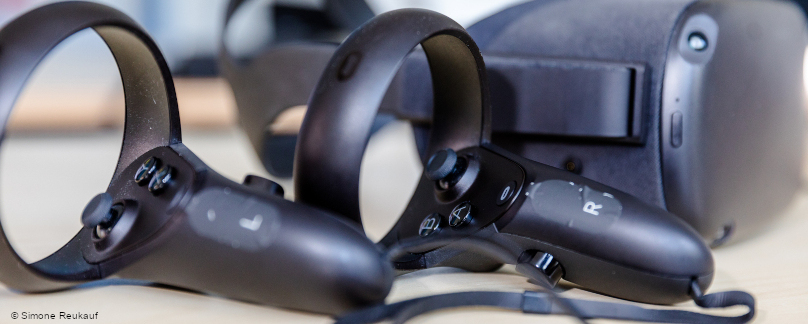
Over the next three years, representatives from the fields of education, business informatics, and theoretical and professional forestry will address issues relating to virtual teaching and learning environments for so-called Waldschulungen, or “forestry training programs” of the future. The new project commenced on May 1st at the department of Information Management and Business Informatics (IMWI) at Osnabrück University. Other partners include the Kuratorium für Waldarbeit und Forsttechnik e. V. (KWF) and Didactic Innovations GmbH. The project is financed as part of the “Renewable Resources” [“Nachwachsende Rohstoffe”] funding program which is overseen by the Federal Ministry of Food and Agriculture (BMEL), having provided approx. €786,400 to date. The project is being overseen by its sponsor, the Fachagentur Nachwachsende Rohstoffe e. V. (FNR). Press Report
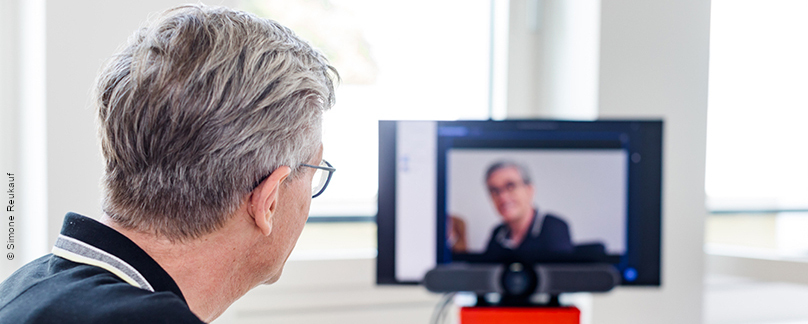
Osnabrück University’s innovative project entitled “UOS.DLL - Digitales Lernen Leben” [“UOS.DLL – Living Digital Learning”] is being funded by the Stiftung Innovationen in der Hochschullehre [Foundation for Innovation in University Teaching] in its program “Hochschullehre durch Digitalisierung stärken” [“Promoting University Teaching through Digitalization”]. The project will receive over three million euros during its three-year duration, which will be used to implement concrete improvements in digital university teaching. In addition, the Foundation for Innovation in University Teaching has also approved an application for the collaborative project entitled “SOUVER@N – Souver@nes digitales Lehren und Lernen in Niedersachsen” [“SOUVER@N - Confident Digital Teaching and Learning in Lower Saxony”]. Total funding amounts to approx. €5m, of which Osnabrück University will receive over €930,000. Press Report
Existing AI Startups
The Aloys & Brigitte Coppenrath Foundation and Osnabrück University have signed a cooperation agreement in support of the student startup LobVR. This newly created healthcare company was founded by five students at Osnabrück University. LobVR aims to use Virtual Reality (VR) to create long-term improvements in therapeutic care for people suffering from addictive disorders. The foundation is providing €36,000 in funding for the project. Press Report
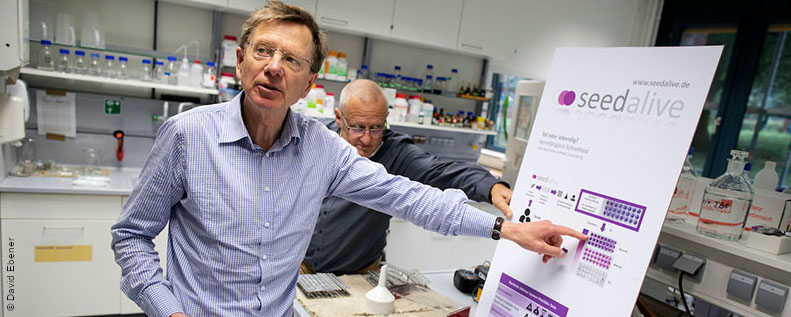
To find out quickly and efficiently whether plant seeds still have the capacity to germinate, scientists in the Botanical Research Group (School of Biology/Chemistry) at Osnabrück University have developed the “seedalive” germination capacity test. The target group for this innovative technology includes seed producers, manufacturers, distributors, gene banks and farmers. This spin-off project has been awarded the “Innovate 2020 German Agri Start-up Award” by the Osnabrück Start-up-Initiative “Innovate!”. The prize is endowed with €3000. In addition, the “seedalive” test has also been awarded an EXIST scholarship by the Federal Ministry of Economic Affairs and Climate Action and is looking to achieve market maturity for its rapeseed and maize tests in the near future. Press Report
The digital learning platform “PearUp” is intended to get 5th-grade school children excited about Computer Science. To this end, the pearprogramming team has designed a digital learning platform that enables school children to pretend to found a virtual IT startup and in doing so to learn the basics of programming. This startup was founded in 2017. Press Report
VisionLab is a startup company funded by the German Research Center for Artificial Intelligence (DFKI). It is seeking to develop technology which can be used for the real-time detection of beverages, foodstuffs and meals. Additional Information
The purpose of the startup NatureRobots is to promote regenerative, ecological and especially small-scale agriculture using AI and robotics in harmony with nature and people. Additional Information
AI-Campus and DFKI-Labor Lower Saxony in Brief
AI-related Programs of Study
The bachelor, master and PhD programs in Cognitive Science deal primarily with the academic study of the brain and the mind. The master program in Cognitive Science is open to international students, who mostly participate online and who are only in Osnabrück for short in-person phases during their studies. The German Academic Exchange Service (DAAD) supported Osnabrück University in setting up this program by providing funding of €540,000 from its “International Programme Digital 2020-2022” fund.
AI is also a core subject in bachelor and master programs and PhD programs in Computer Science. There is also a new “integrated campus” master program in Cognitive Computing for working professionals, which focuses on the ways in which AI simulates human thought processes. The Institute of Computer Science also offers the bachelor program in “Embedded Software Systems”, which studies the interaction between computer systems and surrounding technical systems. These programs also engage in broad discussions about the ethical and social implications of digitalization.
AI-PhD Research Groups
The degree of excellence attained by cognitive research in Osnabrück is reflected in the fact that there are currently two German Research Foundation (DFG) PhD Research Groups: Computational Cognition and Situated Cognition). The purpose of the PhD Research Group in Computational Cognition is to contribute to a better understanding of intelligence in human beings and machines. At its core stands an understanding of the connections between higher and lower levels of cognition, which brings together Cognitive Science and Artificial Intelligence.
An additional PhD Research Group is financed by the university and located in the Institute of Business Informatics. It is called "Trust and Acceptance in Extended and Virtual Working Environments"va-eva). It takes an interdisciplinary approach to studying the involvement of users in Industry 4.0 scenarios in the context of augmented and virtual employment environments.
Moreover, in cooperation with Osnabrück University, the Leibniz Institute for Agricultural Engineering and Bioeconomy (ATB) in Potsdam is training doctoral students at the interface of agricultural science and artificial intelligence. The Volkswagen Foundation is funding the Joint Lab Artificial Intelligence & Data Science as part of the "zukunft.niedersachsen" program.
AI-relevant Profile Lines (2017-2021)
Electronic patient files or autonomous vehicles are only two of the many practical fields to have figured in the profile line Digitale Gesellschaft – Innovation – Regulierung [“Digital Society – Innovation – Regulation”]. Additional projects in this innovative research group include topics like Connected Home, Smart Health Services, Crowdsourcing, Usability und Know-How Protection. At the core of the profile line Kognition: Mensch – Technik – Interaktion [“Cognition: Human – Technology – Interaction”] stand new AI methods and approaches to using Big Data to improve social and communal structures. Examples of these include the evaluation of social networks to make predictions about epidemics, the development of smart e-learning systems, and social aspects of AI in the context of autonomous vehicles. Also included are social, ethnic and legal implications that accompany increasing digitalization and the use of AI.
Contact for Potential Cooperation Partners:
Prof. Dr. phil. Kai-Uwe Kühnberger

Tel.: +49 541 969-3384
kkuehnbe@uni-osnabrueck.de
Room: 50/312
Institute für Cognitive Science
Wachsbleiche 27
49090 Osnabrück




